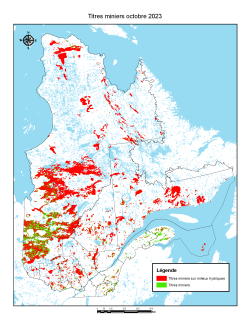(Quebec City) Today, Eau Secours, the Coalition Québec meilleure mine (QMM), and MiningWatch Canada released a first-of-its-kind guide addressing the impacts of mining activities on water, designed specifically to support collective action.
Informing the public about their rights in the face of mining is a key priority for the organisations, given that nearly 60% of the roughly 338,000 active mining claims in the province of Quebec overlap fully or partially with lakes and rivers. And, with the current boom in mining exploration claims, that number is only increasing. Nearly 140,000 of these claims were granted in the last two years alone, posing an increasingly serious threat to water reserves across the province.
This announcement comes during the Quebec Mines+Energy Congress organized by the Ministry of Natural Resources and Forestry at the Quebec City Convention Centre. Two representatives from the Coalition QMM will hand-deliver a copy to the Minister of Natural Resources, Mrs. Maïté Blanchette Vézina, in the afternoon as part of an annual follow-up meeting. During this meeting, the Coalition QMM will reiterate its priorities for mining law reform, emphasizing the importance of establishing an effective and rapid mechanism for the withdrawal of mining claims, something which currently does not exist under Quebec law.
The Citizen’s Guide
Over the course of 50 pages, the Impact of Mining Activities on Water: A technical and legislative guide to support collective action describes the key stages and main activities involved in developing a mining project in Quebec. The Guide describes some of the most significant impacts of mining activity on water – including water contamination and consumption, as well as changes to the quality of surrounding environments – along with main mitigation measures to help address some of these impacts. The Guide provides a brief overview of the legal framework governing these activities and the impacts on water and populations who depend on it, and concludes with proposals to strengthen collective action for residents, civil society, organizations, municipalities, and Indigenous communities.
Produced by Eau Secours with the support of the Coalition QMM and MiningWatch Canada, this Guide aims to equip the people of Quebec with a better understanding of the main issues at stake when it comes to the development of resource extraction projects. It acts as an accompaniment tool as communities advocate for concrete change based on technical and legislative guides that are relevant and accessible. This Guide seeks to encourage both citizen participation in monitoring and overseeing the mining sector – and its publication comes at a crucial moment, as the province of Quebec is currently experiencing a major boom in mining claims.
Translated, illustrated, printed and available for free online
The Citizen's Guide is freely available in French and English on the Eau Secours, Coalition QMM and MiningWatch Canada websites. Many illustrations, tables, timelines, graphs, images and photos make it easy to understand the concepts. Financial contributions from the Western Mining Action Network (WMAN), the Regroupement Vigilance Mines Abitibi-Témiscamingue (Revimat) and the Coalition québécoises des lacs incompatibles avec l'activité minière (Coalition QLAIM) will enable several hundred copies to be printed. A hundred copies have already been produced in English and French, and will be distributed at low cost across the province.
To date, the list of supporters of the Guide already includes a dozen experts, citizen committees and environmental organizations.
Meeting with the Minister of Natural Resources
In addition to presenting the Guide and discussing the issues it addresses, the Coalition QMM’s meeting with Minister Blanchette Vézina will be an opportunity to discuss key priorities for an ambitious reform of Quebec's mining regime. The Minister has announced her intention to reopen the Mining Act, and the Coalition QMM intends to revisit its proposals and recommendations submitted last May during the National Consultation on the Mining Framework.
Quotes:
"The Citizen's Guide aims to equip populations who – from one day to the next – are seeing their water, their environment, and even their health threatened by the mining industry. This tool has the potential to unite and support communities impacted by the extractive industry in Quebec, by democratizing the issues and laying out a detailed roadmap for strengthening public activism,” Rébecca Pétrin, Director, Eau Secours
"Communities are the first line of defence against the mining industry’s destruction of the environment. Equipping people with a winning recipe for themselves and the environment is the best recipe for a strong democracy anchored in a healthy territory,” Rodrigue Turgeon, lawyer, co-spokesperson for the Coalition Québec meilleure mine and Canada Program Co-Lead for MiningWatch Canada.
"In the mining sector, access to clear and transparent information is a complex issue. This Citizen's Guide seeks to lighten the burden of public activism. The tool has the potential to make citizens' voices better heard by democratizing the technical and legislative issues of this industry, and by offering food for thought and suggestions for the development of effective grassroots movements,” Marc Nantel, spokesperson, Regroupement Vigilance Mines Abitibi-Témiscamingue.
"In recent years, the surge in mining activity has added to the long list of threats facing lake protection associations. For these mostly volunteer-run groups, there has been no reference document for understanding and responding to this disturbing new phenomenon. This is exactly the kind of guide that the member associations of the Coalition QLAIM needed,” Louis St-Hilaire, spokesperson, Coalition QLAIM.
"Our experience over the past few years has taught us that informed and well-equipped citizens can make a difference, but that it's difficult to ensure that our health and that of the environment are respected: we therefore enthusiastically welcome the publication of this guide," Nicole Desgagnés, spokesperson, Arrêt des rejets et émissions toxiques de Rouyn-Noranda (ARET) committee.
Related documents:
- Citizen Guide in (1) English and (2) French
- A map of mining claims covering all or part of the lakes and rivers in Quebec
Media contacts:
- Mathieu Langlois, Eau Secours, 514-588-5608, communications@eausecours.org
- Rodrigue Turgeon, Coalition Québec meilleure mine and MiningWatch Canada, 819-444-9226, rodrigue@miningwatch.ca
